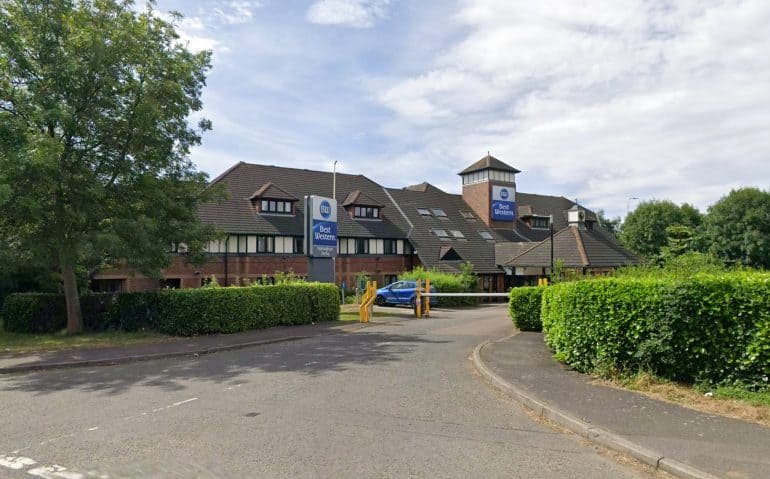-
 play_arrow
play_arrow
Erewash Sound Love Music - Love Erewash
-
 play_arrow
play_arrow
Living with Functional Neurological Disorder for 10 years - Liam Virgo Erewash Sound
Errors from a Derby doctor are being reviewed to establish whether they may have played a part in the deaths of 101 patients, with dozens more possibly having suffered health issues.
A former radiology consultant at Royal Derby Hospital has been under review since concerns were raised by cardiology colleagues in November 2020.
The review looked into 1,224 cases involving the doctor between 2013 and 2020, with affected patients contacted by the University Hospitals of Derby and Burton NHS Foundation Trust, documents seen by the LDRS show.
The trust claims it took an “open and transparent” approach with the public in regards to the review and that it will be published once complete.
The initial review – due to be published in full later this year – found that while there is an expected discrepancy rate of five per cent for cardiac MRI (magnetic resonance imaging) scans, following an audit of 63 cases, the doctor’s discrepancy rate was 37 per cent – seven times the accepted rate, presenting an error with one out of every three scans.
A discrepancy rate across the whole 1,224 cases has not been provided.
The ongoing review found that out of the 1,224 cases, two cases were found to show “definite omission or misinterpretation with unequivocal potential for serious morbidity or threat to life” while 102 cases were found to show “definite omission or interpretation of finding with strong likelihood of moderate morbidity but not threat to life”.
Meanwhile, in 361 cases “clinical significance of disagreement is debatable or likelihood of harm is low” and in 378 cases “disagreement over style and/or presentation of the report including failure to describe insignificant features”.
A total of 176 patients out of the 1,224 assessed have now died, with a “misreported” cardio MRI scan found in 101 of those patients, which will all now be reviewed by the medical examiner to see if that error played a part in their death.
The medical examiner will assess if any of the 101 deceased patients showed evidence that their misreported MRI, or any associated subsequent treatment delay, was “likely” to or “could” have “contributed to”, “caused” or “accelerated” their deaths.
A total of 120 patients had their cases recalled by the trust for further assessment with evidence of “misdiagnosis” “which will have impacted treatment decisions and pathways”.
Of those patients, 41 were ascribed as suffering “low harm”, assessed on the basis of perceived radiation risk from repeated MRI scans.
The hospital trust says it “absolutely apologises” for the impact on patients and says its processes “were not strong enough” but says changes have now been made and it has so far not identified “significant harm”.
It indicated that says processes and training were at fault.
The doctor has now left the trust, it details, adding that “no concerns have been found about the individual’s other areas of practice”.
Meanwhile, the doctor continues to be listed as a recognised trainer by the General Medical Council, which regulates doctors.
The GMC details that the doctor continues to be registered with a licence to practise with no restrictions.
No fitness to practise case has been brought before the Medical Practitioners Tribunal Service by the GMC, the MPTS confirmed.
The trust says those involved in reviewing the case at the time, which included colleagues external to the organisation, took the decision that it did not meet GMC referral thresholds.
The review into the doctor was due to conclude in January this year, which is believed to have then shifted to April and is still pending.
One of the patients in the 1,224-patient review, who was seen by the doctor in 2014, has called for trust management to be held accountable and apologise for their “failures” but urged them not to preach of “lessons learned”.
The patient, who wishes to remain anonymous, told the LDRS: “I want to make clear that I have no problems with the staff. They have been fantastic. They work so hard.
“This is the monumental failure to manage from trust leadership.
“They should have managed this better. They have had five years to look into this. The review has been handled badly and there is an effort now to rescue that.”
The patient detailed that the review ought to have contacted affected patients sooner and in a more sensitive manner which considers the wider impact on their and their family’s health and wellbeing, with changes and interventions now being made which they fear are too little too late.
They said: “We are not going to get the full picture because of how long it has taken. They haven’t considered the future prognosis for patients.
“Nurses rely on diagnoses and care plans and there is potential care here that has not been given.
"This has taken away my choices. Because I didn’t have that knowledge I couldn’t make decisions based on correct information and the people treating me couldn’t make correct decisions either because of the misreporting of a scan (confirmed to be misreported by the trust).
“It is really, really upsetting.
“I am so fed up with chief executives of hospitals standing in front of hospitals and saying ‘lessons have been learned’. I don’t think they are learning lessons.
“Now they are trying to put a plaster on a gaping wound and hoping it will heal and that the scarring won’t be too horrific.”
The patient, who did not want to detail their health conditions, said that when she was notified in 2023 about her misreported MRI – nine years after the scan – they were “livid” and “very upset”.
They said: “They haven’t been open and transparent and the patients don’t all know to ask questions.
“I am gobby enough to stand up for myself. I shouldn’t have to.
“The amount of distress this has caused me and my family.
“I could have been driving down the A38 with my kids in the car and gone into cardiac arrest. It doesn’t bear thinking about.
“They need to consider the ripple effect of what this has caused me and my family. It isn’t just about the physical damage but psychological impact.
“Some people may have had longer.”
Asked what she would like the hospital trust to do, they said: “They need to do right by the families. Hold your hands up and say you got it wrong. Say you are sorry.”
Karen Reynolds, a clinical negligence lawyer at Freeths in Derby, who is representing the patient, said: “As a clinical negligence lawyer representing patients of the Derby Trust for over thirty years, I am shocked that a review of this size and significance hasn’t come to light sooner.
“Had it not been for a distressed patient approaching me to represent them, patients and members of the public may still be in the dark now.
“The fact that the trust were aware of this issue as far back as 2020 and yet still don’t appear to have completed the review into the harm caused is a real concern.
“There may be many more patients than those the trust initially identified who have been affected by this.
“Sadly, we know there are patients who were part of the recall who have since died, and families are bound to have understandable questions for the trust.
“The trust must now be entirely transparent about this review. It is their responsibility to uphold the duty of candour and do what they can to reassure patients.”
Dr Gis Robinson, the trust’s executive chief medical officer, said: “We have re-seen and personally apologised to the 120 patients who have needed to be followed up as part of this review, and while so far the investigation has found no significant harm has been caused, we absolutely apologise again to those affected for the emotional impact this has had and for the extended time this has taken.
“Though scans are just one of many elements we use to diagnose a patient and variations in how clinicians read them are expected, our investigation has shown our processes were not as strong as they could have been and we have made changes – with scans now being reviewed as part of a multidisciplinary team, and a percentage of scans externally audited as an additional safety measure.
“Our priority has understandably been communicating with and supporting those who have been directly affected as we have moved through this process, and we will publish a public report as we normally would once the investigation is complete.”

Written by: Erewash Sound
Similar posts
Sponsors
ON AIR
SEARCH
CATEGORIES
RECENT POSTS

‘Sticking plaster’ support plan for pubs neglects other sectors says Chamber

Are you a member of the Ockbrook School Alumni?

Derby adult club saved from closure after crunch meeting

Derbyshire County Council drops core net zero commitment, shifting towards economic benefits and production

Erewash Sound and The Crockers DJs present ‘Decades of Dance’ – Saturday 4th April
103.5 & 96.8 FM
LOVE MUSIC
LOVE EREWASH
Office: 0115 888 0968
Studio: 0115 930 3450
Erewash Sound, The Media Centre, 37 Vernon Street, Ilkeston, DE7 8PD
© Copyright 2026 Erewash Sound CIC. All Rights Reserved. Company Number 6658171.






